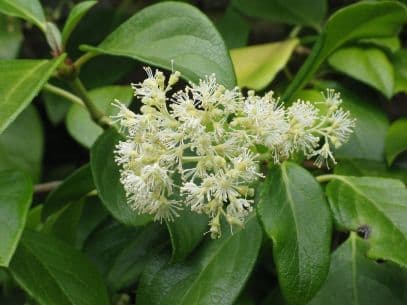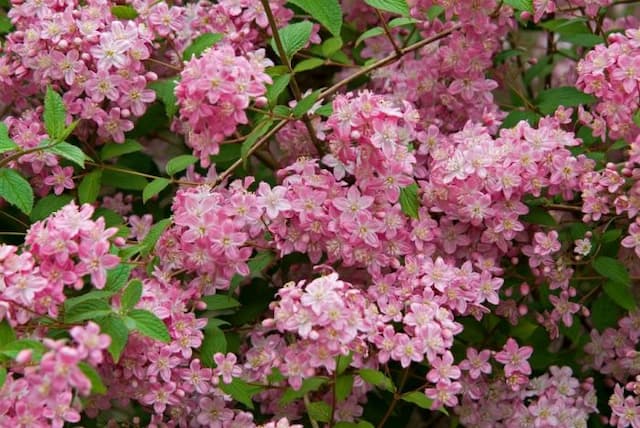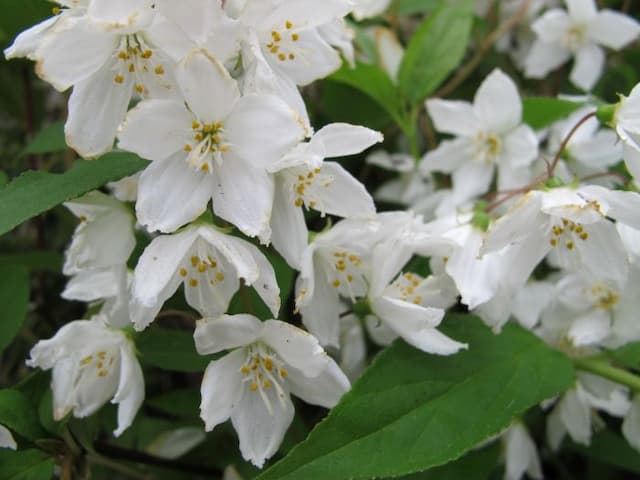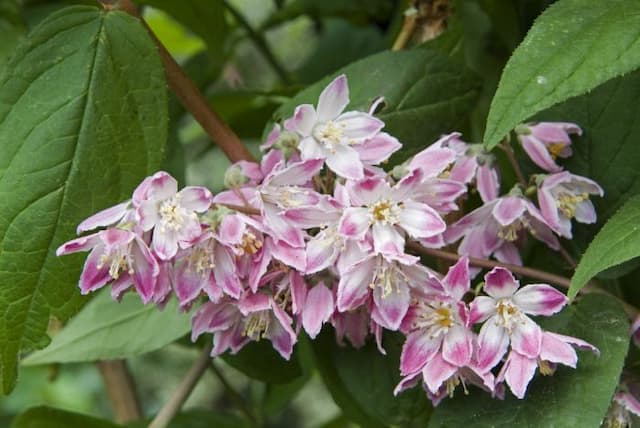Veitch's Deutzia Deutzia longifolia 'Veitchii'

ABOUT
Deutzia longifolia 'Veitchii', commonly referred to as the Veitchii Deutzia, is a deciduous shrub with a bushy and graceful appearance. Its slender, arching branches boast clusters of small, star-shaped flowers that are predominantly white with a hint of pink, especially near the base. These fragrant blooms come together in dense panicles, contributing to a prolific floral display that is particularly noticeable in the spring and early summer. The leaves of the Veitchii Deutzia are narrow and elongated, featuring a bright green color that offers a lush backdrop for the delicate flowers. The foliage adds a fine texture to the landscape with its slightly serrated edges, which can turn to attractive shades in the fall, offering a secondary season of visual interest. This ornamental plant is valued for its elegant structure and the profusion of blossoms that attract pollinators, such as bees and butterflies. Overall, the Veitchii Deutzia is celebrated for its aesthetic qualities, including its charming flowers and pleasant form, making it a popular choice for gardens.
About this plant
 Names
NamesFamily
Hydrangeaceae
Synonyms
Veitch's Deutzia, Showy Deutzia
Common names
Deutzia longifolia 'Veitchii'.
 Toxicity
ToxicityTo humans
Deutzia, including the Deutzia longifolia 'Veitchii', is not known to be toxic to humans. There are no well-documented cases of poisoning from ingesting this plant, and it is generally considered safe around humans. However, as with any plant, individual allergies or sensitivities could potentially cause adverse reactions.
To pets
Deutzia is also not recognized as a toxic plant for pets such as dogs and cats. There are no specific symptoms of poisoning associated with Deutzia longifolia 'Veitchii', as it is generally considered non-toxic to animals. Nevertheless, it is always prudent to prevent pets from eating plants, as individual animals might have unique sensitivities, and consuming non-food items can potentially lead to gastrointestinal upset regardless of toxicity.
 Characteristics
CharacteristicsLife cycle
Perennials
Foliage type
Deciduous
Color of leaves
Green
Flower color
White
Height
4-5 feet (1.2-1.5 meters)
Spread
4-5 feet (1.2-1.5 meters)
Plant type
Shrub
Hardiness zones
5
Native area
Japan
Benefits
 General Benefits
General Benefits- Attracts Pollinators: Deutzia longifolia 'Veitchii' produces flowers that are attractive to bees and other pollinators, enhancing biodiversity in the garden.
- Decorative Appeal: With its abundant and showy white flowers, this shrub adds ornamental value to landscapes, gardens, and parks.
- Easy to Cultivate: This particular variety of Deutzia is known for being easy to grow and maintain, which can be ideal for gardeners of all skill levels.
- Durable: It is relatively resistant to pests and diseases, requiring less intervention and fewer chemical treatments.
- Seasonal Interest: The plant blooms in late spring to early summer, providing visual interest during these seasons.
- Compatibility with Other Plants: Deutzia longifolia 'Veitchii' can be combined effectively with a variety of other plants to create a diverse and attractive garden design.
- Size and Structure: It has a manageable size and pleasing form, making it a good choice for residential gardens and borders.
- Habitat Support: The shrub can offer shelter and nesting sites for certain bird species, contributing to local wildlife support.
- Soil Improvement: As the plant's leaves fall and decompose, they can help enrich the soil with organic matter.
 Medical Properties
Medical PropertiesThis plant is not used for medical purposes.
 Air-purifying Qualities
Air-purifying QualitiesThis plant is not specifically known for air purifying qualities.
 Other Uses
Other Uses- The Deutzia longifolia 'Veitchii', commonly known as Veitch's Deutzia, can be used in miniature gardens or fairy gardens to add charm and a whimsical touch due to its small, delicate flowers and foliage.
- In arts and crafts, the dried flowers of Veitch's Deutzia can be incorporated into pressed flower projects or in the creation of natural potpourris, adding a subtle, sweet fragrance and texture.
- Bonsai enthusiasts might attempt to use Veitch's Deutzia as a subject for bonsai due to its attractive bark and potential for fine branching structures after meticulous pruning.
- The plant's branches may serve as natural stakes or supports for other climbing plants or vines in the garden, integrating well due to their strength and straightness.
- Veitch's Deutzia flowers can also be used to make a gentle, fragrant dye for fabrics, providing a soft, natural colour derived from the petals.
- During festive seasons, the branches and flowers can be incorporated into natural holiday wreaths or table centerpieces, adding seasonal cheer and natural beauty to the decor.
- The plant's dense growth can offer a natural screen or privacy hedge in gardens, creating secluded nooks or camouflaging unsightly areas with its lush foliage.
- For photographers or artists, the picturesque blossoms of Veitch's Deutzia offer a delightful subject for botanical illustration or floral photography, capturing the essence of spring.
- In educational settings, Deutzia longifolia 'Veitchii' can be used to teach botany and horticulture students about plant form, flower structure, and pruning techniques due to its exemplary characteristics.
- Lastly, the wood of Deutzia longifolia 'Veitchii' can be used for small woodworking projects or as kindling for fires, due to its density once dried.
Interesting Facts
 Feng Shui
Feng ShuiThe Deutzia is not used in Feng Shui practice.
 Zodiac Sign Compitability
Zodiac Sign CompitabilityThe Deutzia is not used in astrology practice.
 Plant Symbolism
Plant Symbolism- Beauty and Grace: Deutzia varieties, including 'Veitchii,' are known for their attractive flowers and graceful growth, symbolizing both beauty and grace in the plant world.
- Purity: The delicate white flowers of Deutzia 'Veitchii' can symbolize purity, reflecting the unstained and pristine appearance of the blooms.
- Innocence: White flowers, such as those of Deutzia 'Veitchii,' are often associated with innocence, representing a naive or pure state.
- Renewal and New Beginnings: As Deutzia 'Veitchii' blooms in the spring, it is emblematic of renewal and the start of new phases in life.
 Water
WaterDeutzia requires even moisture, so water it regularly, aiming for about 1 inch of water per week, which equates to roughly 0.6 gallons for a small shrub. During the growing season, check the soil moisture level frequently; it should be moist but not waterlogged. In hot, dry periods, increase watering slightly to ensure the soil doesn't dry out, but always allow the top layer of soil to dry out slightly between waterings. Reduce the amount slightly during the winter months when the plant is dormant. It's best to water deeply and less frequently to encourage strong root growth.
 Light
LightDeutzia, particularly the 'Veitchii' variety, thrives in full sun to part shade. A spot that receives at least 6 to 8 hours of sunlight daily is ideal. However, in particularly hot climates, some afternoon shade can prevent scorching of the leaves. The plant will produce the most abundant flowers when it's placed in an area with ample sunlight.
 Temperature
TemperatureDeutzia 'Veitchii' does well in a wide range of temperatures but prefers temperate climates. It can generally tolerate a minimum temperature of around 5°F and a maximum of around 85°F. The optimum temperature for vigorous growth and flowering lies between 60°F and 75°F. It's hardy and can withstand cold once established but should be protected from extreme heat and frost.
 Pruning
PruningPrune Deutzia 'Veitchii' right after it has finished flowering to remove spent flowers and encourage a tidy growth habit and potentially more blooms the following season. This typically occurs in late spring or early summer. It is important to remove any dead or damaged branches and potentially thin out the shrub to improve air circulation. The plant benefits from a regular pruning schedule annually to maintain its shape and promote healthy growth.
 Cleaning
CleaningAs needed
 Soil
SoilDeutzia prefers well-draining soil with a generous amount of organic matter. A mix of garden soil, peat, and perlite or sand can be ideal for Slender Deutzia. The pH should be slightly acidic to neutral, around 6.0 to 7.0.
 Repotting
RepottingSlender Deutzia does not need frequent repotting; it should suffice to repot every two to three years, in early spring before the onset of new growth.
 Humidity & Misting
Humidity & MistingSlender Deutzia is adaptable but prefers moderate humidity levels, in line with typical outdoor conditions. It does not require any special humidity adjustments when grown outdoors.
 Suitable locations
Suitable locationsIndoor
Place Slender Deutzia in bright, indirect light indoors.
Outdoor
Plant in well-draining soil with full sun to part shade.
Hardiness zone
5-8 USDA
 Life cycle
Life cycleDeutzia 'Veitchii', also known as Deutzia crenata 'Pride of Rochester', begins its life cycle with seed germination, which occurs in a warm and moist environment, usually in spring. After sprouting, seedlings grow into young plants with a root system and foliage. This perennial shrub then enters a phase of vegetative growth, where it establishes a woody structure and branches, with leaves developing a lush green appearance. During late spring to early summer, Deutzia 'Veitchii' reaches its flowering stage, producing clusters of fragrant, star-shaped white flowers that attract pollinators. After pollination, the flowers give way to small, dry fruit capsules, containing seeds for the next generation. The plant enters a period of dormancy in fall and winter, conserving energy before the cycle repeats with the return of warmer temperatures in spring.
 Propogation
PropogationPropogation time
Spring-Early Summer
The most popular method of propagating Deutzia longifolia 'Veitchii', commonly known as the Veitchii Deutzia, is through softwood cuttings. Typically, the best time to take these cuttings is in late spring or early summer when new growth is still flexible but has begun to harden slightly. A cutting should be about 4 to 6 inches (10 to 15 centimeters) long, with several leaves attached. The lower leaves are removed, and the cut end of the stem is dipped in rooting hormone powder to encourage root development. The prepared cutting is then placed in a pot filled with a well-draining potting mix, ensuring that the leaf nodes where the leaves were removed are buried in the soil. The pot is kept in a warm, humid environment with indirect light until the cutting has rooted, which usually takes a few weeks. Maintaining consistent moisture is key throughout the rooting process.





![Rose deutzia [Yuki Cherry Blossom]](/_next/image?url=https%3A%2F%2Fplants-admin.emdemapps.com%2Fimages%2Fplants%2F%2Fimages%2F604b6510a383a.png&w=640&q=75)
![Hydrangea [Hot Chocolate]](/_next/image?url=https%3A%2F%2Fplants-admin.emdemapps.com%2Fimages%2Fplants%2F%2Fimages%2F604b5a066e3bd.png&w=640&q=75)
![Hydrangea [Blackberry Pie]](/_next/image?url=https%3A%2F%2Fplants-admin.emdemapps.com%2Fimages%2Fplants%2F%2Fimages%2F604b56e2abc1d.png&w=640&q=75)

